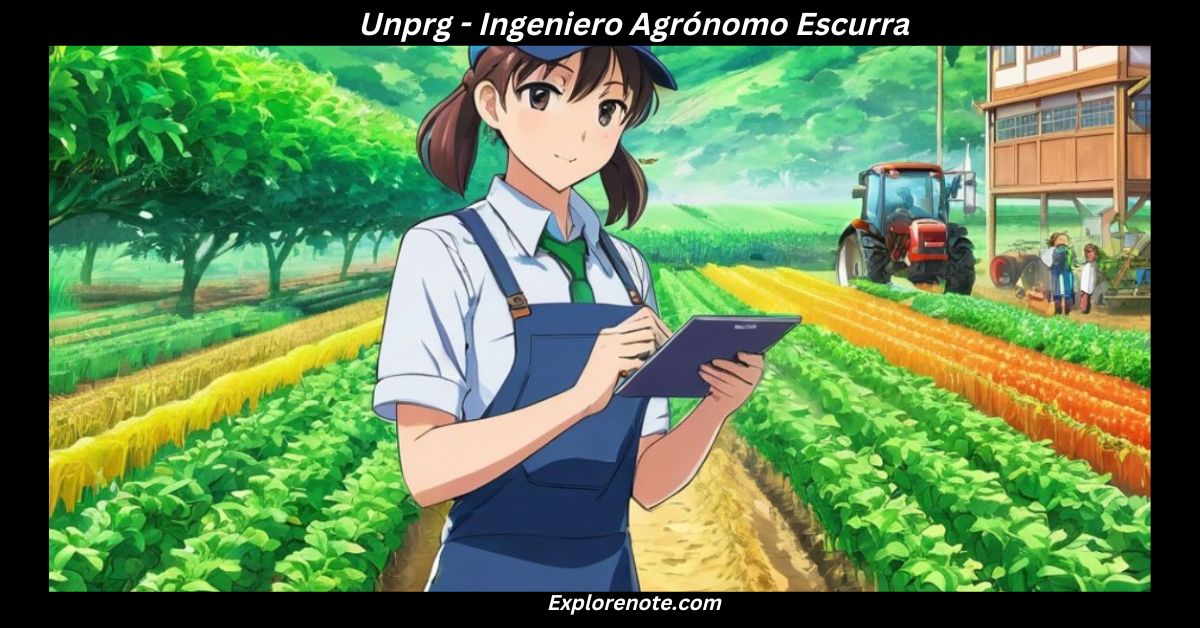The life and work of Ingeniero Agrónomo Escurra, affiliated with the Universidad Nacional Pedro Ruiz Gallo (UNPRG), reveal an inspiring journey dedicated to agricultural advancement.
His contributions have shaped sustainable farming methods and community-oriented agricultural programs, establishing him as a key figure within Latin American agronomy.
This article dives into the significance of “Unprg – Ingeniero Agrónomo Escurra,” unpacking his contributions, methodologies, and the impact he has made.
Our aim is to provide readers with a well-rounded understanding of Escurra’s legacy while ensuring that complex concepts remain accessible and relevant.
Table of Contents
- Background_ The Beginnings of Ingeniero Agrónomo Escurra’s Career
- Education and Professional Development
- Contributions to Agronomy Through UNPRG
- Sustainable Agricultural Techniques
- Impact on Local Communities
- Modern Relevance of Escurra’s Techniques
- FAQs
- Conclusion
Background_ The Beginnings of Ingeniero Agrónomo Escurra’s Career
Escurra’s journey began in a rural setting, where his early exposure to agricultural life shaped his professional direction.
Growing up in a farming community, he witnessed firsthand the importance of sustainable practices and the challenges farmers faced.
These experiences fueled his drive to make a difference in agronomy.
Education and Professional Development
Escurra pursued agronomy at Universidad Nacional Pedro Ruiz Gallo (UNPRG), one of Peru’s most renowned institutions for agricultural studies.
His academic pursuits provided him with a foundation in sustainable practices, plant sciences, and agricultural management.
In addition to formal education, Escurra engaged in hands-on training that allowed him to understand the intricacies of crop management, soil science, and pest control.
Highlights of Escurra’s Education and Skill Development:
- Specialized training in soil science and crop sustainability
- Fieldwork experience, which refined his hands-on approach to agronomy
- Networking with agricultural experts and professionals in Latin America
Contributions to Agronomy Through UNPRG
As an agronomist, Escurra contributed significantly to the Universidad Nacional Pedro Ruiz Gallo’s research and development programs.
He played a pivotal role in developing academic programs and practical training modules aimed at fostering sustainable agriculture.
His influence extended to establishing cooperative initiatives with local farmers, offering them technical advice and resources to optimize crop yields without compromising environmental integrity.
Key Contributions at UNPRG:
- Development of community-based agricultural programs
- Research on sustainable crop rotations and water management techniques
- Introduction of innovative pest management practices that reduce chemical dependency
Sustainable Agricultural Techniques
One of Escurra’s primary focuses was the implementation of sustainable agricultural practices.
Recognizing the impact of climate change on agriculture, he advocated for environmentally friendly farming techniques that prioritize soil health and water conservation.
His work promoted crop rotation, organic fertilizers, and integrated pest management as viable solutions for maintaining soil fertility and reducing harmful environmental impacts.
Techniques Promoted by Escurra:
- Crop Rotation: Alternating crops to maintain soil nutrients and reduce pest infestations.
- Organic Fertilizers: Encouraging the use of compost and other natural fertilizers to enhance soil health.
- Integrated Pest Management: A balanced approach to pest control, minimizing the use of chemicals in favor of natural pest deterrents.
Impact on Local Communities
Ingeniero Agrónomo Escurra’s work made a profound difference in rural communities, where farming was both a livelihood and a way of life.
His approach went beyond academic research; he directly engaged with farmers to bring meaningful change.
By introducing sustainable agricultural practices, he empowered these communities to adopt innovative methods that improved crop yields and, ultimately, their economic stability.
Escurra’s programs also aimed at fostering resilience, giving farmers the knowledge and tools to withstand environmental and economic challenges.
Key Areas of Impact:
- Empowering Local Farmers
Escurra’s community-based initiatives at UNPRG focused on educating farmers about sustainable practices that fit their local environment and resources. By conducting hands-on workshops and interactive sessions, he helped farmers understand how to implement techniques like crop rotation, soil conservation, and organic fertilization. This knowledge enabled them to improve yields without relying heavily on expensive chemicals, which often strain financial resources. - Economic Growth Through Sustainable Practices
Escurra’s efforts helped boost the income potential of many farmers by teaching them practices that increased productivity and reduced costs. For example, his advocacy for organic fertilizers allowed farmers to recycle local resources into compost, eliminating the need for costly chemical inputs. In this way, his approach supported both environmental health and economic resilience, encouraging communities to generate higher profits while maintaining sustainable practices. - Improved Food Security and Nutrition
Through Escurra’s guidance, communities learned how to grow a more diverse range of crops, leading to better nutrition and improved food security. By rotating crops, farmers avoided exhausting the soil’s nutrients, which helped maintain productivity over time. This diverse crop cultivation meant that communities had access to a wider variety of produce, enriching their diets and reducing dependency on imported foods. - Building Resilience Against Climate Change
As climate change poses increasing risks to agriculture, Escurra’s teachings on adaptive farming practices have been especially valuable. By promoting soil conservation, water management, and pest control techniques that work harmoniously with nature, he prepared farmers to adapt to changing weather patterns. Techniques such as water-efficient irrigation systems and drought-resistant crop varieties provided practical solutions to protect crops from extreme climate conditions. - Empowering Women in Agriculture
Recognizing the crucial role women play in farming, Escurra made a conscious effort to involve them in his programs. By empowering women with skills and knowledge, he contributed to a more inclusive agricultural community. Women who were trained through Escurra’s initiatives became active participants in decision-making, crop management, and community-based agricultural activities, leading to greater gender equity in farming. - Establishing Farmer Networks and Cooperative Learning
Escurra’s influence extended beyond individual farmers to establish a network of cooperative learning among communities. He fostered collaboration by bringing together local farmers to share experiences and techniques. This created a support network where farmers could continue learning from each other, even in Escurra’s absence, helping to ensure the long-term sustainability of his initiatives.
Success Stories and Testimonials
Escurra’s programs have led to many success stories within these communities. Farmers who applied his methods often reported not only improved crop yields but also a greater sense of self-sufficiency and pride in their work.
For example, a local farmer stated, “Thanks to Escurra’s teachings, I learned to cultivate my crops without relying on expensive pesticides. My family and I are now able to sell more produce at the market.”
These testimonials showcase the ripple effect of Escurra’s impact, as his students and community members continue to apply and share his techniques, creating a legacy that endures across generations.
Modern Relevance of Escurra’s Techniques
Escurra’s contributions remain highly relevant in today’s context of climate-conscious farming.
His techniques have been integrated into modern agronomic practices, influencing both small-scale farmers and large agricultural enterprises.
By emphasizing sustainability, Escurra’s methods align with global agricultural trends aimed at reducing carbon footprints and promoting environmental stewardship.
Why Escurra’s Methods are Still Important:
- Climate Adaptability: Techniques like crop rotation and organic fertilization are adaptable to diverse climates.
- Economic Sustainability: Reduces dependence on costly chemical fertilizers and pesticides.
- Food Security: Sustainable farming practices support food security by protecting soil and water resources.
FAQs about Unprg – Ingeniero Agrónomo Escurra
Q: Who is Ingeniero Agrónomo Escurra?
Ingeniero Agrónomo Escurra is an agronomy expert from Universidad Nacional Pedro Ruiz Gallo (UNPRG), known for his work in sustainable agriculture and community-focused agronomic programs.
Q: What are the main techniques promoted by Escurra?
Escurra advocates for sustainable practices such as crop rotation, organic fertilizers, and integrated pest management.
Q: How has Escurra’s work impacted local communities?
Escurra’s initiatives have empowered rural communities by educating them on sustainable practices, improving crop yields, and enhancing local food security.
Q: What is UNPRG’s role in Escurra’s career?
UNPRG served as Escurra’s academic and professional base, where he contributed significantly to the development of agricultural programs that emphasize sustainability.
Q: Why are Escurra’s methods still relevant?
Escurra’s sustainable techniques are aligned with global efforts to reduce environmental impacts in farming, making them crucial for modern agricultural practices.
Conclusion
Ingeniero Agrónomo Escurra’s contributions to agronomy go beyond scientific research; his legacy lies in the empowerment of rural communities and the promotion of sustainable farming.
His work through UNPRG has laid a strong foundation for future generations of agronomists, emphasizing that sustainable practices not only benefit the environment but also support food security and economic stability.










